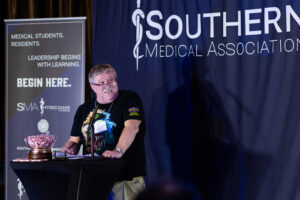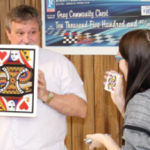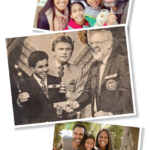The clock was ticking.
Christopher Morris, MD, then an intern and resident in internal medicine at the University of Tennessee (UT) Medical Center, Knoxville, had just 30 seconds to think of the correct response. He already had the answer. His challenge was coming up with the question.
Final Jeopardy
In 1988, Dr. Morris, now a rheumatologist at Arthritis Associates, Kingsport, Tenn., was a contestant on Jeopardy!, the popular TV quiz show hosted by the late Alex Trebek (episode 156). By the end of the show, the three contestants were almost tied. It would come down to the Final Jeopardy answer.
The category was U.S. capitals. The answer: This is the only state that placed the statue of a king in Statuary Hall. (Note: When Congress established the National Statuary Hall in 1864, it set a display limit of two statues per state of deceased state citizens of historic renown or known for distinguished civic or military services.)
“The music started,” recalls Dr. Morris. “I’m looking down on my screen. Everyone is watching me, and I don’t know the answer. So I go state by state starting from the East Coast, head west and wrote Hawaii as my response. The statue was of King Kamehameha, the first ruler of Hawaii.”
All three contestants wrote the same correct answer. Dr. Morris lost, coming in third place. But he’s still proud of his performance.
“We were all very knowledgeable on the show,” he says, explaining that winning is also dependent on timing—hitting the response button at the right moment. “This was my chance to be on the show. I was going to do it come hell or high water.”
Dr. Morris is a trivia buff. For decades, he’s been a voracious reader and consumes information on a wide variety of subjects, particularly in the categories of science and musical theater. He spends his spare time playing trivia games online. He rarely gets stumped and says he occasionally uses his “useless and unimportant knowledge” as an ice breaker with new patients or to bond with existing ones.
Family Trait
Dr. Morris was raised in Springfield, Ill., near the Lincoln Home National Historic Site. Because his mother was part of the International Visitors Commission, Dr. Morris learned many things about President Lincoln, which may have kickstarted his trivia obsession.
But he didn’t get serious about trivia until medical school. He earned his medical-surgical degree in 1987 from the Universidad Autónoma de Guadalajara, Jalisco, Mexico. The following year, he completed a rotating hospital internship at the University of California, Irvine (UCI), and then his internship and residency in internal medicine in 1991 at UT Medical Center. That same year, he served as a senior fellow in the section of rheumatology at the Medical College of Georgia, Augusta, and between 1991 and 1992, he was a first-year fellow in rheumatology at the Bowman Gray School of Medicine (now called the Bowman Gray Center for Medical Education), Wake Forest University School of Medicine, Winston-Salem, N.C.
Dr. Morris and his father, who was also a rheumatologist and trivia expert, usually watched Jeopardy! while on the phone together and tried to predict the Final Jeopardy answer based on the category. He says they would get the right response about twice a month.
All in the Wrist
During the last week of his rotating internship program at UCI, Dr. Morris took a day off work to try out as a contestant for Jeopardy! The show had been advertising for contestants, and its Hollywood studio was only an hour away.
More than 200,000 people each year try to earn a contestant spot, but only 400 to 500 are selected. Dr. Morris says roughly 50 other people showed up the day he tried out. They had to complete a written, 50-question test within 13 minutes. He remembers some of the questions, including: What was the name of the singer known as the Swedish Nightingale? (It was Jenny Lind.)
Dr. Morris and eight others moved on to the next step. They were divided into teams of three and played a practice game with handheld bells. If they knew the question, they were told to ring the bell on the last syllable of the last word of the answer. But if they rang the bell prematurely when actually competing, the bell would be deactivated for two-tenths of a second, minimizing their ability to win.
Out of the nine people, Dr. Morris and four others were chosen as contestants.
The show aired in September 1988. Although he didn’t win, the 15 minutes Dr. Morris spent competing on the nearly 60-year-old quiz show were among the most memorable of his life. Dr. Morris did receive an assortment of consolation prizes: a vacuum cleaner, toddler clothes, artificial nails, bags of rice, a $25 Dolly Madison gift certificate, and a recliner that still sits in his family room.
Switching Roles
Since then, Morris has achieved some local fame. The mother of one of his students had watched his TV debut. And on a visit to Washington, D.C., with the ACR’s Government Affairs Committee, a member asked if anyone knew someone who had been a contestant on Jeopardy! Not being the type to brag, Dr. Morris hesitated, then admitted he had competed, and so had one of his college fraternity brothers, who won a game.
Dr. Morris now hosts and creates the questions for the Smart Bowl, a trivia competition sponsored by the Southern Medical Association. One of his questions is: The human skeleton has seven cervical vertebrae. How many vertebrae does a giraffe have?
“A lot of rheumatologists would be good at trivia because we pick up subtle things that other doctors don’t,” he says, explaining that many symptoms related to rheumatic diseases involve minutia.
Will he try to get on the show once more? Maybe.
“It would be fun to go on Jeopardy! again,” he says. “It was an honor.”

Carol Patton is a freelance writer based in Las Vegas.




